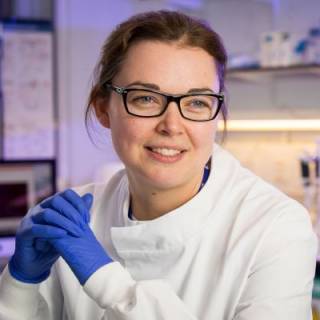By understanding how the structure of the lymph node changes during infection, Dr Sophie Acton hopes to learn lessons that will shed light on tumour biology - and potentially improve the success of immunotherapies.
Tumours are complex structures. As well as cancer cells, they include fibroblasts that generate the matrix binding cells together, as well as various flavours of immune cell. It is increasingly recognised that the nature of this microenvironment is crucial to the survival and spread of a cancer, and to its evasion of host immune responses.
Getting to grips with this complexity is a major challenge. Dr Acton's approach is to focus on understanding normal physiological processes, and how they are subverted in tumours. Her chosen tissue is the lymph node, which undergoes significant remodelling and expansion during infection - changes also seen in tumours.
Her group has a particular interest in dendritic cells, immune cells that traffic to lymph nodes and 'present' antigens to lymphocytes, triggering their proliferation and the launch of an immune response. In addition, dendritic cells also play a key role in initiating lymph node remodelling, through interactions with fibroblastic reticular cells, the main structural cells of lymph nodes.
Dr Acton and colleagues have identified a key molecular interaction that supports the migration of dendritic cells through the lymph node. Migration relies on a cell adhesion molecule known as CLEC-2 on dendritic cells and its glycoprotein ligand, podoplanin, on fibroblastic reticular cells [1]. Notably, this interaction triggers changes in the elasticity of fibroblastic reticular cells, by relaxing their actomyosin cytoskeleton; this enables them to stretch to accommodate an influx of lymphocytes during lymph node expansion [2]. In recent work, Dr Acton has begun to explore how these interactions affect the remodelling of the extracellular matrix, again to support lymph node expansion.
Notably, many tumour types overexpress podoplanin, and overexpression is generally associated with poor prognosis. Dendritic cells infiltrate tumours, and the presence of podoplanin on cancerous as well as fibroblastic cells is likely to have a significant impact on their function. Perhaps, Dr Acton suggests, high levels of podoplanin on tumour cells may alter recruitment of dendritic cells and also affect their trafficking to lymph nodes to stimulate anti-cancer immune responses. By altering the elastic and contractile properties of cancer cells, dendritic cell signalling might also enhance their motility and metastatic spread.
Ultimately, Dr Acton's research could suggest a range of ways to boost anti-cancer immunotherapies. For example, promoting the expansion of lymph nodes could enhance immune responses, including anti-cancer responses, while modulating remodelling of the extracellular matrix in tumours might improve access of cancer-targeting immune cells. Understanding how cellular interactions regulate cancer cell contractility might also point up ways to inhibit their migration and metastatic spread.
- Acton SE et al. Podoplanin-rich stromal networks induce dendritic cell motility via activation of the C-type lectin receptor CLEC-2. Immunity. 2012;37(2):276-89.
- Acton SE et al. Dendritic cells control fibroblastic reticular network tension and lymph node expansion. Nature. 2014;514(7523):498-50
 Close
Close


